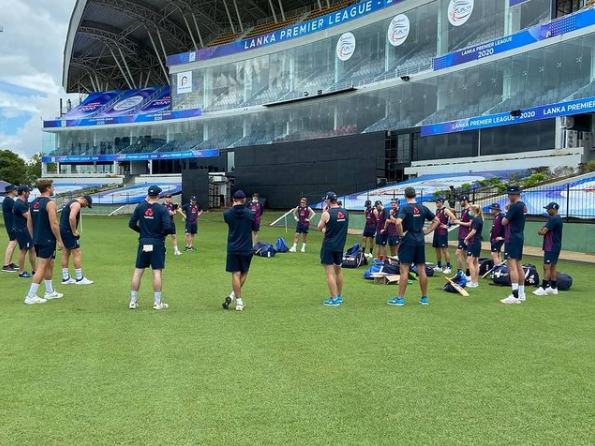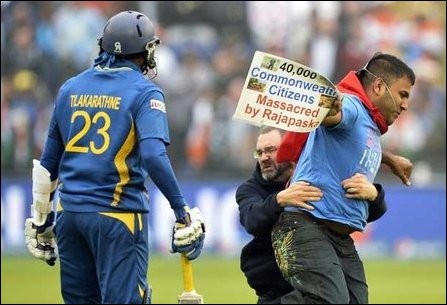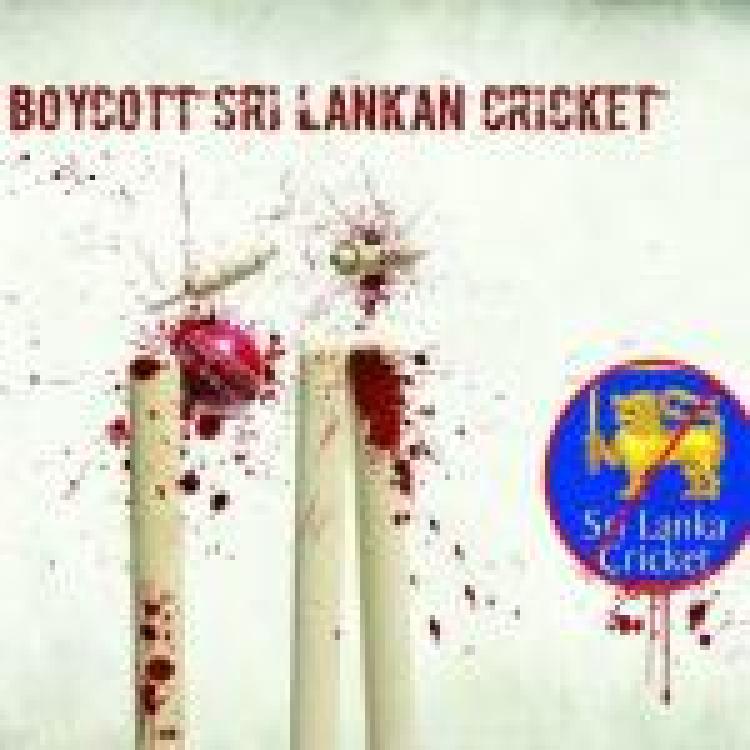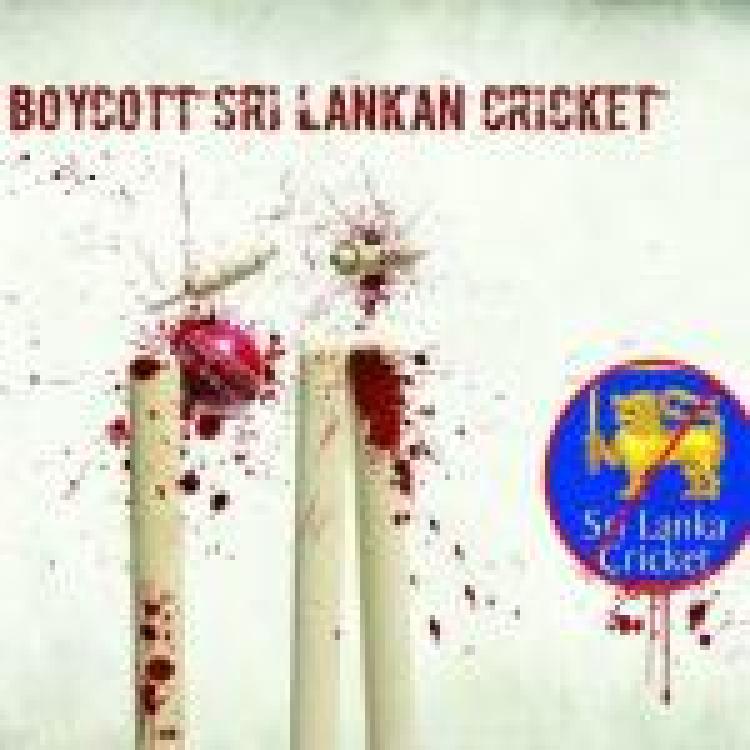
England players at the Mahinda Rajapaksa International Cricket Stadium last month.
England’s cricket team completed their controversial tour of Sri Lanka this month, as they hurriedly left the island without taking questions posed to them on social media after an open call from the British High Commission in Colombo.
“Do you have a question for the English Cricket team?” wrote the High Commission in a social media post last month. “Game on! Type your question below for the team to answer whilst they tour Sri Lanka!”
Hundreds of users subsequently emailed and posted questions on both their Twitter and Instagram pages, largely on the deteriorating human rights on the island and growing calls from anti-racism campaigners for a sporting boycott.
“Did you know that while you're visiting Sri Lanka for your leisure, in the North they destroyed a Mullivaikal remembrance monument?” posted one user on Instagram, one of the more than 160 questions mostly focused on Sri Lanka’s human rights record. “The SL govt won't even let the Tamil people remember/mourn the lives they lost in the most despicable ways. They are trying to maintain an image of a pristine Sri Lanka, and by visiting you are condoning this. Are you aware of this?”
“There's a huge population of Eelam Tamils in UK,” posted another. “Why does the English team keep going back to SL despite the countries genocide against Tamils? Do you support genocide?”
Meanwhile, on Twitter, the UK High Commission received dozens of responses to their call for questions, including from the Sri Lanka Campaign for Peace and Justice.
Are the team aware top members of the Sri Lankan govt have been credibly accused of war crimes? Will they use their trip to highlight human rights violations & plight of families of the disappeared asking the government to tell the truth about what happened to their loved ones?
— Sri Lanka Campaign (@SLcampaign) January 8, 2021
“Top members of the current Sri Lankan government are credibly accused of appalling mass atrocity crimes and alleged perpetrators in the military have been repeatedly rewarded with promotion rather than prosecution,” Melissa Dring, Campaign Director of the Sri Lanka Campaign told the Tamil Guardian. "It's disappointing that the England cricket team missed this opportunity to use their celebrity status to raise awareness of ongoing human rights violations and highlight the suffering of victim-survivor communities in Sri Lanka, including families of the disappeared who have spent years asking the government to tell them the truth about what happened to their loved ones."
“Over a hundred comments were addressed on the Instagram post, promoting the Q&A session of the England cricket team, yet none addressed and all completely overlooked,” added Barbara Vencilas, co-ordinator of the Tamil Youth Organisation, which has been calling on the England and Wales Cricket Board to cease all sporting relations with Sri Lanka.
"As a Tamil community in England, we are appalled and disappointed, at the overlooked genocidal actions of the Sri Lankan state and how the cricket team were willing to contribute to their propaganda."
A controversial tour
England’s tour to the island came as the UN High Commissioner for Human Rights released a damning report on the situation in Sri Lanka, calling for sanctions on the regime as rights abuses continue. The team arrived in Sri Lanka last month and trained at the Mahinda Rajapaksa International Cricket Stadium, before going on to play two test matches. The stadium, named after Sri Lanka’s war crimes accused prime minister, is currently being managed by Brigadier Shanaka Ratnayake, the commander of the Sri Lankan Army Commando Regiment, one a series of appointments that has seen the military become increasingly involved in the island's civilian activities.

A British Tamil protestor holds a placard as he disrupts play in Cardiff, 2013.
British Tamil activists voiced their concern over the tour and pressed for the England players to take a principled and boycott the series. “This regime oversaw the slaughter of tens of thousands and is the most outwardly chauvinistic in decades,” Selva, an activist who has worked on the 'Boycott Sri Lanka' campaigns, told the Tamil Guardian last month. “The English cricket team touring and training at the Mahinda Rajapaksa International Cricket Stadium will be seen as an endorsement of his racist and supremacist politics. In an era where athletes across the globe are taking principled stands against racism, we urge the England team and players to do the same.”
The English cricket team has previously undertaken historic sporting boycotts, refusing to tour Apartheid South Africa in the 1970s and boycotting Zimbabwe in 2008. Campaigners had urged England to do the same with Sri Lanka. The call has a history going back decades, when Tamil activists in the 1970s and 80s would protests outside stadiums and stage pitch invasions as Sri Lanka played in England, as part of long-standing campaigns for justice and accountability.
'A false normalisation'
The British High Commission did post a video showing Joe Root days later, answering questions there purportedly were sent in. However, none of the questions answered by Root appeared on either the Twitter or Instagram in response to the post, nor did they address the human rights situation on the island or calls for a sporting boycott.
“What is your favourite part about playing in Sri Lanka?” was the first question Root was asked instead, in a post that had just seven likes at the time of writing.
“What’s your like travelling around the world together as a team and representing Great Britain? (sic)” read another question that was posed to the England Captain. “A great honour,” replied Root.
The avoidance of questions linked to human rights will likely raise more controversy around the role of the UK government, and the British High Commission in particular, in pushing Sri Lanka on issues of accountability.
Whilst Britain’s minister of State for the Foreign and Commonwealth, Lord Tariq Ahmad, tweeted about his concerns over Sri Lanka’s continued policy of forced cremations and inability to deliver justice, on the same day High Commissioner Sarah Hulton in Colombo posted a video playing cricket with her Sri Lankan counterpart.
HC @SarojaSirisena and I are both looking forward to the #SLvsEng Test match.
— Sarah Hulton OBE (@SarahHultonFCDO) January 22, 2021
Good luck to @englandcricket and @OfficialSLC – we’ll be cheering you on!
pic.twitter.com/7kquQ20uIh
The British High Commission has been contacted about the lack of answers from the English cricket team. To date, there has been no comment.
"As Sri Lanka comes back under the scrutiny of the UN Human Rights Council, the players could have helped to bring global attention to these issues," commented Dring. "By staying silent, the team enables the Sri Lankan government to present itself as acceptable when it should face international censure."
"On the island of Sri Lanka, politics and sports are not different," added Vencilas. "Sports drives the political nature of the island, the same political state who have been accused of war crimes, abuse of human rights and the genocide of the Tamil nation. We are extremely saddened and angered by England’s cricket team touring the genocidal state. Everyone, this includes sportsmen and sportswomen, have the moral responsibility to stand up against injustice."
"For decades Sri Lanka has used sport to project normality within its shores and whitewash mass atrocity crimes it has and continues to commit against the Tamil people,” said the Tamil Youth Organisation UK in a letter to the England and Wales Cricket Board last month. “This tour will only aid Sri Lanka to falsely project normalisation instead of achieving it through tangible efforts towards accountability and justice.”
“The England and Wales Cricket team and the Board have a moral duty to use their position in the cricketing world to send a clear and loud message to human rights violators in Sri Lanka and other parts of the world, and stand firm against war crimes, crimes against humanity and genocide.”


